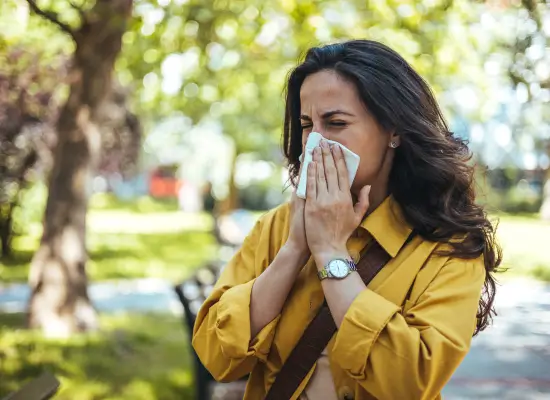Allergies are widespread, affecting millions globally. Genetic factors, environmental influences, and lifestyle changes contribute to their increasing prevalence.

Synopsis
Allergic conditions affect millions worldwide, disrupting daily life and reducing overall health quality. The field of allergy and immunology focuses on studying the connection between allergic responses and the immune system, identifying effective diagnostic methods, treatments, and preventive measures. Thanks to advancements in medical technology, patients now have access to efficient skin allergy and blood allergy treatments.
Gleneagles Hospital provides comprehensive allergy care, making it a leading hospital for allergy treatment. This article explores immune system mechanisms, common allergies, current treatments, and new developments in allergy management.
Understanding Allergy and Immunology
The field of allergy and immunology studies, identifies, and manages disorders of the immune system, including allergic diseases and their symptoms. An allergy occurs when the body’s defense system mistakenly identifies harmless substances as harmful, triggering an immune response. Symptoms may involve the skin, respiratory system, or gastrointestinal tract and can range from mild to severe.
The Role of the Immune System in Allergies
The link between allergies and the immune system is important to the allergic response. The job of the immune system is to protect itself and keep microorganisms, including some bacteria, viruses, and fungi, out of the body and kill any infectious microorganisms that get into the body. When an individual with an allergy comes into contact with something harmless like dust, mould, or pollen, their immune system may overreact by creating antibodies that "attack" the allergen. It initiates the release of histamines, producing symptoms like itching, swelling, or breathing difficulties.
Common Allergy Reasons
It's critical to understand the causes of allergies in order to properly diagnose and treat them. The condition known as allergy occurs when the immune system overreacts to allergens, leading to various allergic disorders. Several of the most prevalent allergy reasons include:
- Pollen: A primary cause of seasonal allergic rhinitis (hay fever), affecting those who are sensitive to airborne allergens.
- Dust mites: These microscopic organisms are found in household dust and are a major cause of respiratory allergies.
- Food allergens: Nuts, dairy, wheat, and shellfish are among the foods that might trigger allergic responses, some of which are quite severe.
- Insect stings: Bee and wasp stings can lead to life-threatening anaphylaxis in some people.
- Medications: Certain painkillers and antibiotics cause negative immune reactions, necessitating subspecialty allergy and immunology treatment.
- Mould spores: Commonly prevalent in humid environments, they might exacerbate immunological and respiratory allergies.
- Animal dander: Pet hair and skin particles are the cause of respiratory responses and skin allergy issues.
Consulting a specialist is important for blood and skin allergy management. Selecting a top hospital like Gleneagles Hospital ensures comprehensive care for allergies and immune system disorders.
Your health matters – get expert advice today.
Types of Allergic Diseases
Excessive immunological responses to a variety of allergens can result in allergic disorders. Based on how each person's immune system reacts, allergic responses might vary from person to person. Effective diagnosis and treatment of many allergies depend on understanding their symptoms. Several prevalent allergic illness types include the following:
1. Respiratory Allergies
The airways are affected by respiratory allergies, which can cause breathing problems.
- Asthma: An inflammatory respiratory disease that has been present for a long time and causes tightness in the chest, wheezing, and difficulty breathing. Of all the allergy diseases, it is the most common.
- Allergic Rhinitis: Often known as hay fever, this condition is brought on by exposure to airborne allergens such as pollen, dust mites, and pet dander and manifests as sneezing, runny or itchy nose and watery eyes.
2. Skin Allergies
Rashes, itching, and inflammation are symptoms of skin allergic diseases. The source and severity of a skin allergy determine how it is treated.
- Eczema (Atopic Dermatitis): A disorder that results in chronic dry, irritated, and itchy skin. It is most frequently linked to immune system dysfunction and allergies.
- Urticaria (Hives): characterised by skin welts that are red, swollen, and itchy; these welts can appear out of nowhere in response to allergens such as food, medications, or insect bites.
- Contact Dermatitis: When the skin is exposed to allergens such as chemicals, metals, or cosmetics, an allergic response occurs.
3. Food Allergies
Swelling, pain in the stomach, nausea, vomiting, rash, and breathing difficulties are just a few of the mild, serious, or even fatal symptoms that can result from a food allergy. Nuts, milk, eggs, and wheat are common foods that cause food allergies. A severe reaction needs immediate medical care.
4. Drug Allergies
Certain medications, including anaesthetics, NSAIDs, and antibiotics, might cause allergic reactions in certain persons. Mild rashes and severe anaphylaxis are among the symptoms. Blood allergy therapy may be necessary for severe medication allergies.
5. Insect Allergies
Bites from certain insects can result in severe allergic reactions, sometimes even lethal anaphylaxis. In order to control symptoms and consequences, treatments must be administered immediately.

Diagnosing Allergies
If allergy symptoms persist or recur, consult an allergist promptly. Gleneagles Hospital offers advanced diagnostics such as:
- Skin Prick Test: By exposing the skin to allergens it may identify allergic responses.
- Blood Allergy Test: Does test for IgE levels to confirm allergic reactions.
- Patch Testing: Used for diagnosing contact dermatitis.
- Elimination Diets: It aids in determining food allergy by eliminating known allergens from the diet.
- Pulmonary Function Tests: Lung function tests are used to diagnose respiratory allergies.
Treatment for Allergies
The foundation of effective allergy management is symptom management and significant response avoidance. Based on the kind and severity of allergy diseases, a variety of techniques are used.
1. Avoidance of Allergy Triggers: The prevention of allergic reactions can best be done by finding and avoiding allergic reasons or provokers. A physician with a speciality in Allergy and Immunology is the best doctor to diagnose the reasons for allergy and suggest modifications to the way of life that can reduce exposure to a minimum. When it comes to treating skin allergies and respiratory allergies, prevention is crucial.
2. Medications for Allergy Relief: Different medications are used to treat and manage immunological responses and allergies:
- Antihistamines: Reduce sneezing, itching, and rashes.
- Nasal Sprays: Relieve congestion and inflammation.
- Eye Drops: Provide relief from itching and redness.
- Oral Medications: Treat severe allergic responses using oral medications.
3. Immunotherapy for Long-Term Relief: Immunotherapy is occasionally recommended for persistent allergies that don't improve with other treatments. At this point, the immune system is conditioned to respond more favourably over time by a series of allergy injections prepared from pure extracts of allergens. Another technique for treating pollen allergies is sublingual immunotherapy, which involves placing a pill beneath the tongue.
4. Emergency Epinephrine for Severe Allergies: Patients with life-threatening allergies must always keep an emergency epinephrine shot (EpiPen, Auvi-Q) with them. This injection controls severe allergic reactions until medical help is imminent.
Allergy Prevention and Management
Allergies can be effectively managed with both medical intervention and lifestyle changes, even if they cannot always be cured. Among the most crucial techniques are:
- Avoiding anything that can cause allergic responses.
- Regularly cleaning carpets, dusting surfaces, and washing linens will help keep indoor spaces tidy.
- Wearing protective attire when exposed to outdoor allergens such as pollen and insect stings.
- Following a balanced diet rich in foods that reduce inflammation in order to support immune system maintenance and reduce allergic responses.
- Maintaining pets' grooming and exposure to animal dander if one is sensitive
- Frequent nasal irrigation helps remove allergens from the respiratory system.
- Controlling stress levels since long-term stress impairs immunity and makes allergic responses worse
Through the integration of these steps in day-to-day living, people are able to substantially lower the effects of allergies and enhance their well-being.
Why Choose Gleneagles Hospital for Allergy Treatment?
Gleneagles Hospital is a premier facility for skin and blood allergy treatment:
- Expert Immunologists: The hospital employs highly trained allergy and immunology experts known as specialist best immunologist available.
- Advanced Diagnostic Facilities: State-of-the-art technology for accurate allergy detection.
- Personalised Treatment Plans: Each therapy follows customised approaches to provide medical treatments which fit individual patient requirements.
- Comprehensive Allergy Clinics: The hospital operates a dedicated service through Comprehensive Allergy Clinics that provides specialised care for blood allergies, skin allergies, and respiratory conditions.
- Emergency Allergy Care: For severe allergic reactions, seek medical attention right away.
- Holistic Approach: Combining lifestyle changes with contemporary medication to improve allergy control.
Conclusion
Understanding allergy and immunology is essential for improving quality of life. Recognizing triggers, identifying allergic conditions, and seeking expert care are key. Gleneagles Hospital provides modern, world-class skin allergy treatment, blood allergy therapy, and immunotherapy for all patients. With years of practical expertise and commitment to excellence, it remains a top hospital for allergy treatment. Consult our specialists today to start your path to better health.
Experience: 14 Years
Pulmonology,Interventional Pulmonology and Sleep Medicine
Hyderabad, Lakdi-Ka-PulExperience: 5 Years
Pulmonology,Interventional Pulmonology and Sleep Medicine
Hyderabad, Lakdi-Ka-PulExperience: 15 Years
Heart and Lung Transplant,Pulmonology,Interventional Pulmonology and Sleep Medicine
Bengaluru, Kengeri
Frequently Asked Questions
Allergic responses may increase or decrease over time due to different stages of life. Proper management and treatment can significantly reduce symptoms.
Allergy symptoms include continuous sneezing and itchy eyes without fever, while colds cause body aches, fever, and immune system activation.
Allergy management includes maintaining home cleanliness, avoiding allergens, using air purifiers, and following doctor-recommended treatments.
Gleneagles Hospital offers advanced diagnostics, personalised care, and effective treatments for all types of allergies.















